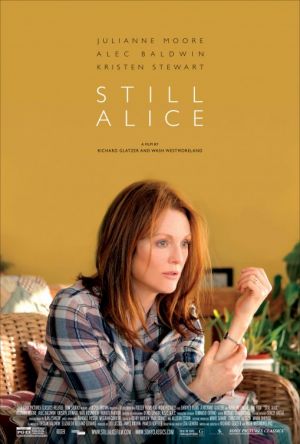
By Spencer Williams
Not a single Ice Bucket Challenge to be had in this emotional drama that somehow leaves you wanting a bit Moore (not sorry).
It occurred to me halfway through Richard Glatzer and Wash Westmoreland’s Still Alice how boring watching the Oscars was going to be, knowing that four fantastic leading actresses were going to get all dolled up for one fantastic night of losing to Julianne Moore. It’s totally ok though. She deserves that statue, damn it, because the movie itself would crumble without her.
Julianne Moore gives a devastating performance as Dr. Alice Howland, a professor of linguistics who is diagnosed with early onset Alzheimer’s disease. To make matters worse, Alice’s disease is genetic, meaning that all three of her (aggravatingly beautiful) children are susceptible to inheriting the illness later on life. Meanwhile, Alice’s husband (an excruciatingly awkward Alec Baldwin) has just been offered a new job position in Minnesota (how could one possible say no to that?) and tries to convince Alice that their life in the big apple can easily be packed up and moved out into farm country like no big deal. Except, for Alice, it is a big deal because she’s having a hard time remembering things like who her children are, let alone what room she’s in. But Alec Baldwin is having none of that, ladies and gentlemen. His scientific research is just too important. Anyways, back to Moore.
The most interesting aspect of the film is that Dr. Howland seems to be acutely aware of her deteriorating mental state. As a linguistics professor, her entire career has been centered on the many ways humans communicate with each other. As her memory begins to falter, Alice finds herself stripped of everything she’s researched in her field of academia. Moore does a fantastic job of guiding the viewer through many of Alice’s stages of grief, while simultaneously portraying her rapid decline of mental stability as she succumbs to her illness. It’s truly a wonder to see Moore operate on so many different emotional levels. In fact, she manages to convey so much feeling in just a single glance, that one wishes the film didn’t think it had to rely on the ham-fisted orchestral music to drive the emotional beats point home. I don’t need violins or cellos to squeeze any more tears from my eyes, thank you very much. Julianne Moore’s facial expressions are enough.
Another surprise is Kirsten Stewart’s portrayal of Alice’s youngest daughter, Lydia. Out of all of Alice’s (obnoxiously gorgeous) children, Lydia is the one who seems to understand her mother’s plight the most, and Stewart does an excellent job of portraying a woman who knows she can’t do anything more than be around for support. Elsewhere, Kate Bosworth (playing the eldest daughter Anna) and Hunter Parrish (playing the son, Tom) barely register. In the end though, this is Moore’s show, and one wishes the movie were as excellent as she is in the titular role.